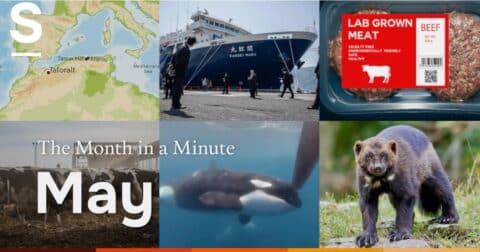Analysis
The Month in a Minute: December 2024
Month in a Minute•2 min read
Analysis
May's top stories about climate, animals and health.


Words by Ross Kinghorn
This month, Japan’s new 9,300-ton whaling vessel set sail on its first hunt, with plans to catch around 200 whales by the end of the year. Meanwhile, the Biden Administration will be paying dairy farmers to put measures in place to protect against bird flu, after farm owners were reluctant to allow state and federal officials access to cows. Also this month a new study showed that cows have human flu receptors, raising the stakes on a bird flu outbreak in dairy cattle.
Plus:
It’s so hot in Mexico that howler monkeys are falling dead from the trees. At least 138 of the midsize primates known for their roaring vocal calls have been found dead in the Gulf Coast state of Tabasco.
A decade of research on animal consciousness should influence their legal status, experts say.
Orcas sank another ship in the strait of Gibraltar.
Here are more headlines that caught our attention this month:
Smallholder farmers like the late Osvalinda Pereira face a campaign of deadly threats and harassment from big companies that produce feed for animals in Europe and China.
Tyson Foods says recent plant closures helped the company drive out “waste from the business,” leaving contract chicken farmers stuck with uncertainty and massive loans.
Ranchers contend the state is violating its own management plan by not eliminating a wolf suspected in a half-dozen cattle deaths.
British, Irish and Canadian hog farms are looking to get ‘Prop 12 certified’ to sell pork to the Golden State.
Bayer is laying the groundwork to fend off future Roundup litigation. The agrochemical giant’s lobbyists are supporting legislation in a number of states to thwart personal injury lawsuits alleging that pesticides made them sick.
It’s so hot in Mexico that howler monkeys are falling dead from the trees. At least 138 of the midsize primates, who are known for their roaring vocal calls, have been found dead in the Gulf Coast state of Tabasco.
Wealthy nations reducing their financial support for livestock farming would help tackle pollution caused by consuming red meat and dairy, according to the World Bank.
Millions in federal research funding for farming practices is going to ineffective climate solutions like regenerative agriculture.
Australian cattle producers want to follow in the U.S. industry’s food steps by adopting a “climate neutral” approach to climate change mitigation policies.
The mass death of little penguins has been reported along South Australia’s south coast as birds wash up at Goolwa Beach.
The bird flu strain found in U.S. cattle has been sent to a high-security research facility so that experts can examine the potential risks to people and livestock.
The U.S. and Europe are taking steps to acquire or manufacture H5N1 bird flu vaccines to protect at-risk poultry and dairy workers, veterinarians and lab technicians, government officials said, moves influenza experts say could curb the threat of a pandemic.
Federal officials are offering $75 to dairy workers who agree to be tested for bird flu. But advocates say testing positive costs a lot more.
The butter board is just the beginning. From Mr. Beast to the McDonald’s mascot Grimace, industry fingerprints are all over dairy’s viral campaign.
Cities and climate activists seek accountability for meat and dairy in the court system.
The purpose of Alabama and Florida’s new laws aren’t to protect consumers from cell-cultivated meat — it’s to protect the cattle farming industry.
Lawmakers in Kentucky overrode their governor’s veto of new ag-gag legislation in order to ban drone investigations in the state.
The House Agriculture Committee passed Farm Bill language, but the vote foreshadows a tough route to passage in the fall.
Iowa’s governor signs a law mandating new labeling requirements for plant-based and cultivated meats.
A store in Singapore is selling lab-grown chicken, but it contains only 3 percent animal cells.
As millions of taxpayer dollars flow to livestock companies — including in support of Tyson’s so-called “climate-friendly” beef — watchdog groups call out the lack of government oversight.
New legislation in Hawai’i would welcome businesses run out of home kitchens as a means of scaling up the state’s food system.
Plant-based honey could help save the most at-risk bees: native pollinators.